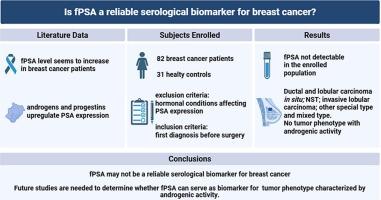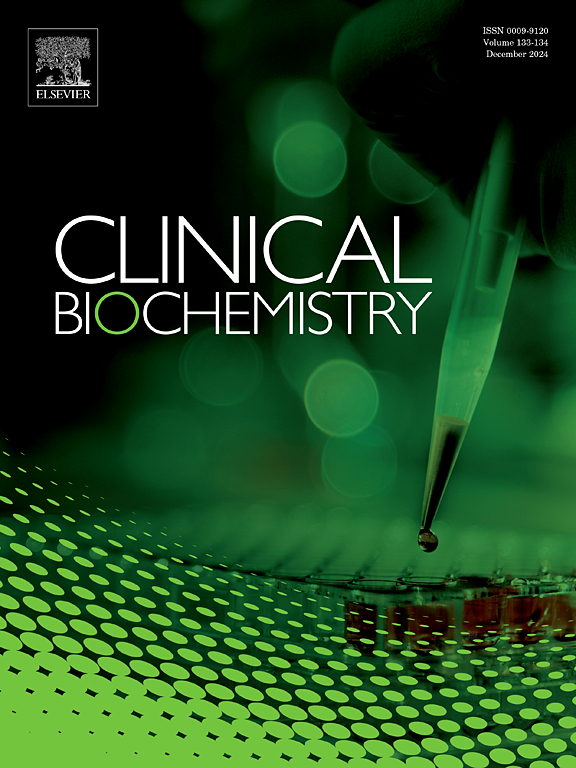Circulating free PSA in breast cancer patients: is it a reliable biomarker?
IF 2.1
3区 医学
Q2 MEDICAL LABORATORY TECHNOLOGY
引用次数: 0
Abstract
Introduction
Prostate-specific antigen (PSA), a serine protease primarily expressed in the prostate, has also been detected in hormonally regulated female tissues, including the breast. Some studies suggest a correlation between increased levels of circulating free PSA (fPSA) and breast cancer, but its role remains debated. This study aimed to evaluate this association while minimizing hormonal confounding factors.
Methods
A total of 82 breast cancer patients (aged 35–86 years) and 31 healthy premenopausal women (aged 18–58 years) were enrolled. Patients had a primary breast cancer diagnosis with no other malignancies and had not undergone preoperative chemotherapy or radiotherapy. Participants with hormonal conditions affecting PSA expression were excluded. fPSA levels were measured using an improved VIDAS® fPSA immunoassay with enhanced analytical sensitivity.
Results
Despite the increased sensitivity of the modified assay, fPSA was undetectable in all plasma samples. This may be due to the exclusion of participants with hormonal imbalances who might exhibit higher PSA expression.
Conclusions
The absence of androgen receptor (AR)-positive triple-negative breast cancer (TNBC) patients in this cohort further supports the role of androgens in PSA regulation. These findings suggest that fPSA may not be a reliable circulating biomarker for breast cancer. However, a key limitation is the lack of fPSA assessment within breast cancer tissue. Future studies should investigate its expression in tumors, particularly in AR-positive TNBC, and evaluate circulating fPSA and testosterone levels as potential biomarkers of tumor androgenic activity.

乳腺癌患者循环游离PSA:它是一个可靠的生物标志物吗?
前列腺特异性抗原(PSA)是一种主要在前列腺中表达的丝氨酸蛋白酶,在包括乳房在内的受激素调节的女性组织中也被检测到。一些研究表明,循环游离PSA (fPSA)水平升高与乳腺癌之间存在相关性,但其作用仍存在争议。本研究旨在评估这种关联,同时尽量减少激素混杂因素。方法入选82例乳腺癌患者(年龄35 ~ 86岁)和31例健康绝经前妇女(年龄18 ~ 58岁)。患者原发乳腺癌诊断无其他恶性肿瘤,术前未接受化疗或放疗。排除激素状况影响PSA表达的参与者。使用改进的VIDAS®fPSA免疫分析法测量fPSA水平,提高了分析灵敏度。结果尽管改进后的检测方法提高了灵敏度,但在所有血浆样品中均检测不到fPSA。这可能是由于排除了可能表现出较高PSA表达的激素失衡的参与者。结论该队列中雄激素受体(AR)阳性三阴性乳腺癌(TNBC)患者的缺失进一步支持了雄激素在PSA调节中的作用。这些发现表明,fPSA可能不是乳腺癌的可靠循环生物标志物。然而,一个关键的限制是缺乏乳腺癌组织内的fPSA评估。未来的研究应该调查其在肿瘤中的表达,特别是在ar阳性的TNBC中,并评估循环fPSA和睾酮水平作为肿瘤雄激素活性的潜在生物标志物。
本文章由计算机程序翻译,如有差异,请以英文原文为准。
求助全文
约1分钟内获得全文
求助全文
来源期刊

Clinical biochemistry
医学-医学实验技术
CiteScore
5.10
自引率
0.00%
发文量
151
审稿时长
25 days
期刊介绍:
Clinical Biochemistry publishes articles relating to clinical chemistry, molecular biology and genetics, therapeutic drug monitoring and toxicology, laboratory immunology and laboratory medicine in general, with the focus on analytical and clinical investigation of laboratory tests in humans used for diagnosis, prognosis, treatment and therapy, and monitoring of disease.
 求助内容:
求助内容: 应助结果提醒方式:
应助结果提醒方式:


